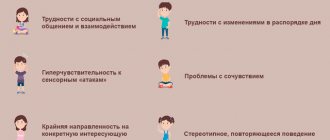Mental health is a very sensitive topic. Clinical manifestations of mental disorders depend on the age of the child and the influence of certain factors. Often, due to fear for future changes in their own life, parents do not want to notice some problems with the psyche of their child.
Many people are afraid to catch the sidelong glances of their neighbors, feel the pity of their friends, or change their usual life order. But the child has the right to qualified, timely assistance from a doctor, which will help alleviate his condition, and in the early stages of certain diseases, cure a mental disorder of one spectrum or another.
One of the complex mental illnesses is childhood psychosis. This disease is understood as an acute condition of a child or a teenager, which manifests itself in his incorrect perception of reality, his inability to distinguish the real from the imaginary, and his inability to really understand what is happening.
Features of childhood psychoses
Mental disorders and psychoses in children are not diagnosed as often as in adult men and women. Mental disorders come in different types and forms, but no matter how the disorder manifests itself, no matter what symptoms the disease has, psychosis significantly complicates the life of the child and his parents, prevents him from thinking correctly, controlling actions, and building adequate parallels in relation to established social norms.
Childhood psychotic disorders are characterized by:
- Delayed development of skills and intelligence. This feature appears in most cases. But there are diseases, for example, autism, during which the child has bright and advanced abilities in some area of activity. Experts say that in the early stages, mental disorders in children are difficult to distinguish from simple developmental delays, and therefore it is impossible to recognize a mental disorder.
- Problems with social adjustment.
- Violation of interpersonal relationships.
- A sublime and special attitude towards inanimate objects.
- Supporting monotony, not accepting changes in life.
Childhood psychosis has different forms and manifestations, which is why it is difficult to diagnose and treat.
Problems of school maladjustment
There is also a 7-year-old crisis. This is the age when a child starts school. And here he gains even more independence, here he begins to understand what responsibility is, begins to receive the inclinations of ideas about legal capacity, that is, the idea that his actions have some consequences, and these consequences are connected specifically with him.
At this age, the child is also quite vulnerable. First-graders can stumble already in the first months of school, we call this the problem of school maladaptation
. They are unable to establish connections with classmates, constant disagreements arise with the teacher, they refuse to go to school, they throw tantrums right in class, interfere with everyone’s learning by getting up from their seats, not realizing that they are not allowed to walk around the class. The reaction of teachers means nothing to them; this leads to a serious conflict with many participants in the school process, not only with classmates and teachers, but also with the school principal. And parents are also starting to take part in this.
Many parents take the child’s side, considering him undeservedly offended. They see the problem in the incompetence of teachers and begin to blame teachers, often adding fuel to the fire of these neurotic symptoms and behavioral disorders that I have already mentioned.
Why are children susceptible to mental disorders?
Multiple causes contribute to the development of mental disorders in children. Psychiatrists identify whole groups of factors:
- genetic;
- biological;
- sociopsychological;
- psychological.
The most important provoking factor is a genetic predisposition to mental disorders. Other reasons include:
- problems with intelligence (mental retardation and others like it);
- organic brain damage;
- incompatibility of the temperament of the baby and the parent;
- family discord;
- conflicts between parents;
- events that left psychological trauma;
- medications that can cause a psychotic state;
- high fever, which may cause hallucinations or delusions;
- neuroinfections.
To date, all possible causes have not been fully studied, but studies have confirmed that children with schizophrenia almost always have signs of organic brain disorders, and patients with autism are often diagnosed with cerebral insufficiency, which is explained by hereditary causes or injuries during childbirth .
Psychosis in young children can occur due to parental divorce.
At-risk groups
Thus, children are at risk:
- one of whose parents had or has mental disorders;
- who are brought up in a family where conflicts constantly arise between parents;
- have had neuroinfections;
- those who have suffered psychological trauma;
- whose blood relatives have mental illnesses, and the closer the degree of relationship, the greater the risk of developing the disease.
Causes of psychosis in children
The cause of psychosis lies in the failure of the normal functions of neurons, when the nervous system begins to work “with errors,” which is manifested by the characteristic symptoms of mental disorders.
There can be many reasons why a child may develop a psychotic state. Among the most likely we highlight:
- Hereditary factor. Parents can pass on genes that are responsible for predisposition to the disease.
- Epilepsy.
- Oxygen starvation during pregnancy and childbirth.
- Mental trauma.
- Mental illnesses, for example, schizophrenia, bipolar disorder, etc.
- Use of illegal drugs or alcohol by a teenager and some others.
Types of psychotic disorders among children
Children's mental illnesses are divided according to certain criteria. Depending on age, there are:
- early psychosis;
- late psychosis.
The first type includes patients with mental disorders of infancy (up to one year), preschool (from 2 to 6 years) and early school age (from 6-8). The second type includes patients of pre-adolescence (8-11) and adolescence (12-15).
Depending on the cause of the disease, psychosis can be:
- exogenous
– disorders caused by exposure to external factors; - endogenous
– disorders provoked by the internal characteristics of the body.
Depending on the type of course, psychoses can be:
- reactive
, which arose as a result of prolonged psychological trauma; - acute
– arising instantly and unexpectedly.
A type of psychotic disorder is affective disorder. Depending on the nature of the course and symptoms of affect disorders, there are:
- depressed;
- manic;
- schizoaffective;
- organic.
Treatment of manic and depressive psychosis
Coping with the syndrome is possible only through complex therapy, which combines several methods of influence: psychological, biological and social therapy. It is customary to distinguish several main stages:
- Relieving the manifestations of symptomatic disorders through the use of medications. If MDP develops in the active phase, then specialists most often use antipsychotics. If a depressive disorder occurs, patients are prescribed antidepressants
- Stabilization of the condition involves strengthening the results obtained. As a rule, it is necessary to try to minimize irritating factors that can provoke further development of a depressive state.
- Carrying out preventive measures. It goes away over a long period of time to minimize the likelihood of relapse. As a rule, it takes at least a year to restore the patient to normal condition and reduce the likelihood of relapse.
In addition, homeopathic remedies can be used that have a positive effect on the patient’s condition. However, they must be prescribed by the attending physician on an individual basis.
Symptoms depending on the form of failure
Different symptoms of mental illness are justified by different forms of the disease. Common symptoms of the disease are:
- hallucinations - the baby sees, hears, feels something that is not really there;
- delusion – a person sees the existing situation in his own incorrect interpretation;
- decreased clarity of consciousness, difficulty in orientation in space;
- passivity, lack of initiative;
- aggressiveness, irritability, rudeness;
- obsession syndrome.
- deviations associated with thinking.
Psychogenic shock often occurs in children and adolescents. Reactive psychosis occurs as a result of psychological trauma.
This form of psychosis has signs and symptoms that distinguish it from other mental spectrum disorders in children:
- its reason is deep emotional shock;
- reversibility - symptoms weaken over time;
- symptoms depend on the nature of the injury.
Early age
At an early age, mental health problems manifest themselves in autistic behavior in the child. The baby does not smile or in any way show joy on his face. Up to a year, the disorder is detected in the absence of humming, babbling, and clapping. The baby does not react to objects, people, or parents.
Age crises, during which children are most susceptible to mental disorders from 3 to 4 years, from 5 to 7, from 12 to 18 years.
Early mental disorders manifest themselves in:
- frustration;
- capriciousness, disobedience;
- increased fatigue;
- irritability;
- lack of communication;
- lack of emotional contact.
Later ages up to adolescence
Mental problems in a 5-year-old child should worry parents if the child loses already acquired skills, communicates little, does not want to play role-playing games, and does not take care of his appearance.
At the age of 7, the child becomes mentally unstable, he has an appetite disorder, unnecessary fears appear, his performance decreases, and rapid fatigue appears.
At the age of 12-18, parents need to pay attention to their teenager if he or she develops:
- sudden mood swings;
- melancholy, anxiety;
- aggressiveness, conflict;
- negativism, inconsistency;
- a combination of the incompatible: irritability with acute shyness, sensitivity with callousness, the desire for complete independence with the desire to always be close to mom;
- schizoid;
- refusal of accepted rules;
- penchant for philosophy and extreme positions;
- intolerance of guardianship.
More painful signs of psychosis in older children include:
- suicide attempts or self-harm;
- causeless fear, which is accompanied by palpitations and rapid breathing;
- desire to harm someone, cruelty towards others;
- refusal to eat, taking laxative pills, strong desire to lose weight;
- increased feeling of anxiety that interferes with life;
- inability to persevere;
- taking drugs or alcohol;
- constant mood swings;
- bad behavior.
Bipolar manic depressive psychosis
It is characterized by a sharp change in the emotional background, where episodes of joy contrast sharply with depression or apathy. Therefore, this disease is classified as an affective mental disorder.
The development of the diagnosis can occur at any age, but most often it affects the younger generation aged 20-30 years. The bipolar type of disorder is much less common, and the probability of the disease ranges from 0.4-1.6%.
The symptoms of bipolar manic depressive psychosis can be divided into three categories:
- Signs characteristic of mania: an excessive feeling of happiness, speech that is too fast, due to which it is impossible to understand what the person is saying, increased impulsiveness and constant anxiety, inadequate assessment of one’s own strengths and capabilities.
- Depressive symptoms: sadness, loneliness, melancholy, pessimistic mood persist for a long time, thinking and speech slow down, reluctance to lead an active lifestyle, isolation, sometimes suicidal tendencies develop
- Psychosomatic: the emergence of delusional ideas (thinking is characterized by unrealistic images), hallucinations. Often the manifestations are similar to those of schizophrenia.
However, it is worth noting that, unlike schizophrenia, these manifestations are not sustainable.
Diagnostic criteria and methods
Despite the proposed list of signs of psychosis, no parent can definitely and accurately diagnose it on their own. First of all, parents should take their child to a psychotherapist. But even after the first appointment with a professional, it is too early to talk about mental personality disorders. A small patient should be examined by the following doctors:
- neurologist;
- ENT;
- speech therapist;
- psychiatrist;
- a doctor who specializes in developmental diseases.
Sometimes the patient is admitted to a hospital for examination and necessary procedures and tests.
First aid for psychosis
You cannot treat psychosis on your own. Traditional methods or attempts to ignore the disease will lead to worsening. If you notice signs of a psychiatric disorder in a loved one, you should consult a doctor.
In acute forms of the disorder, hospitalization is indicated. Before the ambulance arrives, the person nearby can try to alleviate the patient’s condition:
- Ensure peace and quiet.
- Sit next to him, but not in front of him, and constantly talk.
- Don’t argue, listen, ask more questions about his thoughts and experiences, distract him from depressive thoughts.
- Ensure the safety of others and the patient himself. Exacerbations are often accompanied by aggression and a desire to harm oneself.
- When transporting him to the hospital, be nearby, support him, and convince him that his life is not in danger.
First aid will be provided better if you tell doctors in detail about all the features of the patient’s behavior. Every little thing can make a difference.
Providing professional assistance
Short-term attacks of psychosis in a child disappear immediately after their cause disappears. More severe diseases require long-term therapy, often in an inpatient hospital setting. Specialists use the same drugs to treat childhood psychosis as for adults, only in appropriate doses.
Treatment of psychoses and psychotic spectrum disorders in children involves:
- prescription of antipsychotics, antidepressants, stimulants, etc.;
- consultations with relevant specialists;
- family therapy;
- group and individual psychotherapy;
- attention and love of parents.
If parents were able to identify a mental disorder in their child in time, then several consultations with a psychiatrist or psychologist are usually sufficient to improve the condition. But there are cases that require long-term treatment and being under the supervision of doctors.
Psychological failure in a child, which is associated with his physical condition, is cured immediately after the disappearance of the underlying disease. If the illness was provoked by a stressful situation experienced, then even after the condition improves, the baby requires special treatment and consultations with a psychotherapist.
In extreme cases, when severe aggression occurs, the child may be prescribed tranquilizers. But for the treatment of children, the use of heavy psychotropic drugs is used only in extreme cases.
In most cases, psychoses experienced in childhood do not return in adulthood in the absence of provoking situations. Parents of recovering children must fully adhere to the daily routine, do not forget about daily walks, a balanced diet and, if necessary, take care of taking medications in a timely manner.
The baby cannot be left unattended. If there is the slightest disturbance in his mental state, it is necessary to seek help from a specialist who will help him cope with the problem that has arisen.
To treat and avoid consequences for the child’s psyche in the future, it is necessary to follow all recommendations of specialists.
Favorable treatment prognosis
There are also many other mental illnesses, it is almost impossible to cover everything. The only thing that needs to be said is that children with certain mental disorders, as a rule, are treated quite well, that is, it is sometimes possible to achieve much greater results with them than with adults. But only under one condition: if their relatives, especially parents, who are extremely concerned about the health of their child, agree with psychiatrists that their beloved child needs the help of a child psychiatrist.
Child psychiatry, as a rule, uses not only medical, that is, purely psychiatric technologies, with medications or some other methods of treatment. Psychologists are mostly involved in child psychiatry. Family psychologists conducting group psychotherapy, teachers, various kinds of educators, defectologists, speech therapists, and pediatricians participate in the provision of assistance. As a rule, this is a whole multi-professional team that takes on the child’s health and which jointly solves various aspects of his problem.
Seeking medical help in such a situation will greatly facilitate the task of diagnosis, since in child psychiatry there are many methods, including very accurate, almost 100% methods for diagnosing certain mental illnesses.
For example, genotyping is very widely used, when we can with a high degree of probability diagnose a particular disease associated with a mutation or genetics. The main thing is that the child is in the field of view of specialized specialists. The main thing is that he receives the medical care he needs on time in order for his future life to be healthy.
Recommendations for parents
Every parent concerned about the mental health of their child should remember:
- do not forget that psychosis is a disease that needs treatment;
- treatment should be started in a timely manner, and the visit to specialists should not be delayed;
- it is necessary to consult with several specialists, because proper treatment is the key to success;
- for the treatment and prevention of the disease, the support of family and friends is important;
- goodwill towards the patient speeds up the treatment process and ensures lasting results after treatment;
- after treatment, the baby must be returned to a normal environment and make plans for the future;
- it is necessary to create a calm atmosphere in the family: do not shout, do not practice physical or moral violence;
- take care of the baby’s physical health;
- avoid stress.
Love and care are what any person needs, especially a small and defenseless one.
Course of manic-depressive psychosis
According to studies, the course of MDP in 70% of cases occurs in shallow affective phases, deterioration develops only in 30%. The disease manifests itself at strictly specific intervals, for example, exacerbations can be associated with the seasons, or timed to coincide with certain events in a person’s life. If the course manifests itself as bipolar disorder, then there may be dual phases, alternating with slight clearings. Variation can also occur when a depressive state is replaced by enlightenment, then a manic phase begins and stabilization occurs again.
Most often, chronic depression appears in adulthood. The duration often varies in the range of 10-15 years. But we should not exclude the possibility that a person will be able to get out of this state. Depression is often called “frozen” when the state in the same pore persists for a certain time.








